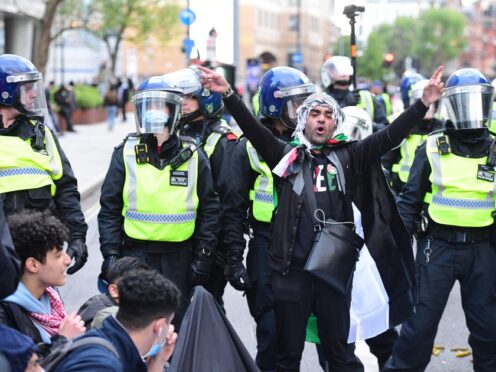
The public want to see protests policed and not simply managed, the Prime Minister has said.
Rishi Sunak said his Government will give officers its backing when they “take action” at pro-Palestinian demonstrations.
He made the comments during a hastily arranged address outside No 10 Downing Street on Friday in which he railed against extremism and Islamism.
He said the UK’s streets had been “hijacked” by people “hostile” to British values during protests in support of a ceasefire in the Israel-Hamas war, which has raged for almost five months.
The Prime Minister on Wednesday met senior police chiefs to discuss the security situation for MPs as tensions simmer as the impact of the Middle East conflict reverberates among British communities, particularly those with a significant Muslim population.
MPs have spoken of increased levels of intimidation from pro-Palestinian supporters, including having their homes targeted by protesters.
The meeting with senior officers was held after the Home Office announced a £31 million security package to protect MPs from threats, including providing elected politicians with a dedicated police contact to liaise with over safety issues.
After the meeting, the Prime Minister warned that the UK is descending into “mob rule” and urged police they must use the powers they have or risk losing public confidence.
In an echo of that message on Friday, Mr Sunak — who in November voiced his support for banning pro-Palestinian marches during the weekend of Remembrance Day — said: “This week, I have met with senior police officers and made clear that it is the public’s expectation that they will not merely manage these protests, but police them.
“And I say this to the police: we will back you when you take action.”
The National Police Chiefs’ Council has been contacted for comment.
The Palestine Solidarity Campaign (PSC) this week told a press conference in Parliament that marches it had arranged had been subject to “politicised policing” with “unprecedented restrictions”.
In a document shared with reporters, the organisation said police had “behaved in a discriminatory and hostile manner to legal protest”.
After the Prime Minister’s latest remarks, Ben Jamal, director of the PSC, wrote on X: “So Rishi Sunak wants to deal with ‘extremists’.
“Maybe he should start with politicians, political commentators and religious leaders who support a state, on trial for genocide, in its mass slaughter, and deliberate creation of famine. Not those protesting against it.”
So Rishi Sunak wants to deal with " extremists". Maybe he should start with politicians, political commentators and religious leaders who support a state, on trial for genocide, in its mass slaughter, and deliberate creation of famine. Not those protesting against it.
— Ben Jamal (@BenJamalpsc) March 1, 2024
Ilyas Nagdee, racial justice director at Amnesty International UK, said peaceful protest in opposition to the events in Gaza “must not be conflated with extremism”.
“People are protesting because of the terrifyingly high civilian death toll in Gaza, which is still mounting inexorably, and the Government’s lack of action for an immediate ceasefire to stem the unbearable suffering,” he said.
“The threat to impose yet more restrictions on people’s right to peacefully protest is deeply worrying and suggests the Government is determined to silence those who may disagree with its policies.
“This is entirely in line with the chaotic patchwork of legislation and sweeping policing powers we have seen introduced in recent years.”
During his address to the nation, the Prime Minister set out a “new, robust framework” to “ensure that we are dealing with the root causes” of extremism.
Support for the anti-terrorism Prevent programme would be “redoubled”, he said, to “stop young minds being poisoned by extremism”.
There will be fresh demands on universities to “stop extremist activity on campus” and the Home Office will be charged with acting to “prevent people entering this country whose aim is to undermine its values”.
Home Secretary James Cleverly has instructed immigration officials to remove people on visas if they “choose to spew hate, or protest or seek to intimidate people”.
In a call for unity and stronger social cohesion, Mr Sunak said it was “not enough” for people in Britain to “live side-by-side”, adding “we must live together united by shared values and a shared commitment to this country”.

Enjoy the convenience of having The Sunday Post delivered as a digital ePaper straight to your smartphone, tablet or computer.
Subscribe for only £5.49 a month and enjoy all the benefits of the printed paper as a digital replica.
Subscribe